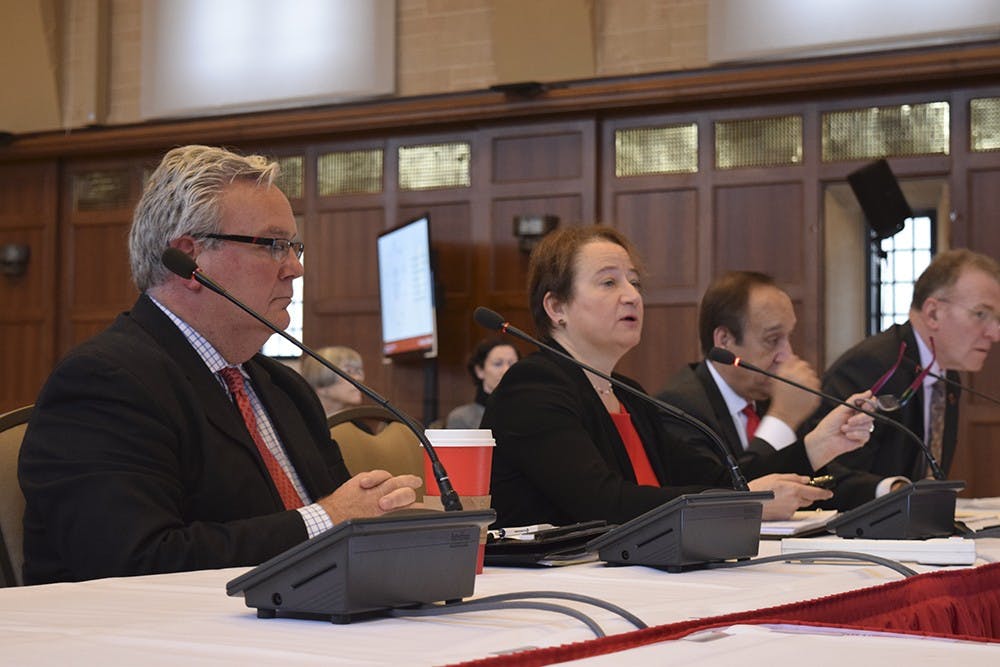After approval, President McRobbie’s contract now ends June 30, 2021.
This allows McRobbie to continue to serve as president through the University’s bicentennial, IU trustee James Morris said.
The Board of Trustees convened for its last day of meetings Friday in Alumni Hall in the Indiana Memorial Union.
On the agenda for the day were the Finance, Audit and Strategic Planning Committee, the Academic Affairs and University Policy Committee, and the business meeting.
The Academic Affairs and University Policy Committee met second to hear presentations on academic and career advising, as well as the Grand Challenges initiative.
John Applegate, executive vice president for University academic affairs; Rebecca Torstrick, IU South Bend professor; Dennis Groth, vice provost for undergraduate education, and Stephen Hundley, IU-Purdue University Indianapolis professor, gave the report on academic advising.
“Advising, as we all know, is central to student success and completion,” Applegate began.
Advisors do not often reach out to students. Instead, students reach out to advisors. Torstrick said one of the goals of changing academic advising is making it more proactive, rather than reactive.
Torstrick said this is important because students feel this is important as well.
It’s something students want and something students will use, Torstrick said.
Following the academic advising presentation was a career advising presentation, led by IU-Bloomington Provost Lauren Robel. She described the steps taken to further career advising since 2013 and initiatives taking place in the near future.
Robel discussed the different types of career services on campus including the Career Development Center, the Arts and Sciences Career Services and career services programs in the graduate school.
She also announced the Arts and Sciences Career Services will be housed in Ernie Pyle Hall by fall 2017.
Many trustees said both academic and career advising are important aspects that need to be a focus. It is an area in which IU should be investing, McRobbie said.
Fred Cate, vice president for research, took the floor last to lead a presentation on the Grand Challenges initiative.
Many trustees said they were excited about the initiative, expressing how pleased they were with Cate’s work.
“We have an opportunity to make the world a better place and to challenge our people, our faculty,” IU trustee Patrick Shoulders said.
Prior to the Academic Affairs and University Policy Committee, the Finance, Audit and Strategic Planning committee met. Its agenda included an annual financial report, a residential housing business model presentation and an insurance update.
The meeting began with an annual financial report given by Joan Hagen, associate vice president and University controller, and MaryFrances McCourt, senior vice president and chief financial officer.
The report included statistics on changes between fiscal year 2014 and fiscal year 2015 and net positions. The report also broke down the sources of revenue. The largest source of revenue was tuition at 37 percent, followed by state appropriations at 18 percent.
After hearing the financial report, IU trustee Andrew Mohr said one of the biggest concerns financially is the increase in enrollment and how it affects the budget.
“We have to able to be nimble and work quickly,” Mohr said. “We have to be ready and have the opportunity to make those changes.”
McCourt then gave a review of the residential housing business models on each campus.
Thirty percent of students at IU-Bloomington are in campus housing, and occupancy in residential housing has not dipped past 95 percent, McCourt said.
Ending the day was the business meeting where all action items were approved.






